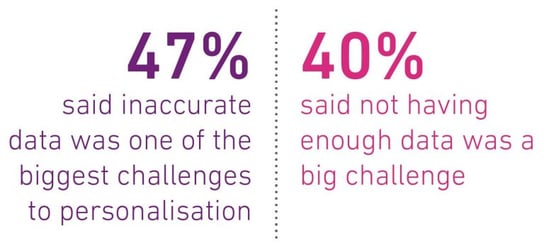Are guests getting the kind of personalisation that they want from your property?
Personalisation is more than just a buzzword, more than a trend. It’s a lifestyle that has become almost impossible to avoid. From customised suggestions in Google searches, to targeted advertising on social media platforms, to personal discounts on regular purchases, personalisation is everywhere. And yet, despite so many companies personalising experiences for their consumers, it’s still an effective tool for marketing to guests, and developing brand loyalty, when it’s done right.

But what can accommodation providers do to get personalisation right and increase repeat bookings and rave reviews? In this month’s trend digest, we look at why basic personalisation simply doesn’t cut it any longer, and what can be done to improve the personalised experience that you are offering to your guests.
Beyond the Basics: Why Customers Are Demanding Next-Level Personalisation
The first step that many properties take towards personalisation is starting to refer to guests by name across their website and digital communications. This can make guests feel like they are not just another faceless visitor, but a recognised patron. However, according to Pure360, this small change is simply not enough.
“92% of consumers are unlikely to engage with marketing that addresses them by name… 93% are unlikely to engage with birthday messages… Consumers are demanding that personalisation adds real value, and most brands aren’t delivering.” — Pure360
While changing the way you address your guests is certainly a step in the right direction, the value that is added to a guest’s interaction with your brand is minimal without further steps being taken to personalise their experience with you. But further steps require further information about your guests and potential guests, and how willing are they to provide the necessary details?
Sign up for Pure360’s webinar >>
Customers Are Willing to Swap More Data for Personalized Marketing
As it turns out, a good deal of consumers are not only happy to provide more data in order for their experiences to be tailored to their preferences, but expect that you should already be making use of the data that you have about them. As Salesforce points out, “62% of consumers say it’s acceptable for companies to send personalized offers/discounts based on items they’ve already purchased.”
“Customers know that companies need more of their data in order to deliver personalized experiences — and a majority are now on board with that. Fifty-seven percent of consumers say they're willing to share personal data in exchange for personalized offers or discounts.” — Salesforce
Knowing that your potential guests are happy to entrust their information to you in return for a personalised experience does make it easier to provide such an experience, but if all of your guests gave you their information tomorrow, would you know what details you should be focussing on?
Read the full Salesforce article >>
The six principles of personalization for hotel websites
We’ve written before about what hoteliers need to know about personalisation technology, but one of the best personalisation tools that at any property has at their metaphorical fingertips is their website. Visitors to your website come with any number of details attached to them, from their gender, to their age, their previous purchases, their marital status, and so very much more. But are these the details that you should be focussing on? Not according to Phocuswire.
“When thinking about personalization, the idea of personal data mining is inevitable. But for a hotel website, past likes, gender or age are far less valuable than the number of times on the website, click patterns and country of visit.” — Phocuswire
Sifting through collected data to find what you need to personalise your guest experience is an invaluable exercise, but is not the only one that you should undertake when it comes to processing data.
Read the full GuestRevu article >>
Read the full Phocuswire article >>
The state of personalisation – it’s still high on the marketing agenda
Not having enough data would clearly be a stumbling block to any property’s attempt to provide personalised experiences, but there is a challenge that is almost as difficult to overcome — that of inaccurate data.

Image © Experian
In their 2018 research paper on embracing the data challenge in a digitised world, Experian investigated what accounted for data inaccuracy, with reasons ranging from human error, to inadequate technology, to a lack of skill, resources, budget and support. Only 2% of participants in the research claimed not to have inaccurate data in their organisation. And, as Experian point out in another article, “attempting personalisation with inaccurate data is a sure-fire way of achieving the exact opposite of what you want.”
“When the goal is to deliver relevant and tailored experiences, if the information you’re basing the decisioning on is incorrect then the wrong experience will be delivered.” — Experian
Read the Experian Research Paper >>
Read the Experian article >>
The Personalization Revolution: When The World Revolves Around YOU
So, what does it feel like when the right experience gets delivered? While, in the background, your personalisation technology is pulling and analysing data, from a guest’s perspective, Shep Hyken tells Forbes, it should feel seamless.
“The key to effective online personalization is to deliver an individualized experience that does not draw attention to the “man behind the curtain,” the technology that makes it possible.” — Shep Hyken, Forbes
And there are properties who get it right, ensuring that guests who visit them have a personalised experience to remember.
Read the full Forbes article >>
Read the full GuestRevu listicle >>




